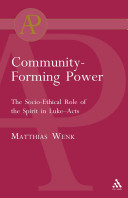Matthias Wenk: Community-Forming Power, reviewed by Amos Yong
 Matthias Wenk, Community-Forming Power: The Socio-Ethical Role of the Spirit in Luke-Acts, Journal of Pentecostal Theology Supplemental Series 19 (Sheffield, England: Sheffield Academic Press, 2000), 368 pages, ISBN 9780567043504.
Matthias Wenk, Community-Forming Power: The Socio-Ethical Role of the Spirit in Luke-Acts, Journal of Pentecostal Theology Supplemental Series 19 (Sheffield, England: Sheffield Academic Press, 2000), 368 pages, ISBN 9780567043504.
Those who have been keeping abreast of the developments in biblical scholarship by Pentecostal scholars are in for a treat with this book. A pastor and part-time lecturer at the Theologisch-Diakonisches Seminar Aarau in Hindelbank, Switzerland, Wenk has revised his doctoral dissertation written under the guidance of Max Turner—who may be most familiar to readers of this journal as the author of The Holy Spirit and Spiritual Gifts (Hendrickson, 1998)—at London Bible College. Here, he extends the insights of Turner, and other Pentecostal biblical scholars like Robert Menzies and James Shelton, by showing how the Holy Spirit in Luke-Acts is more than just the divine person who inspires the speech of the people of God. Rather, inspired speech is but the initial work of the Spirit of God through which the believing community is transformed. The result is an illuminating exposition of the Spirit’s work in Luke-Acts that highlights a) the content of Spirit-inspired speeches; b) the divine intent behind such Spirit-inspired speeches; and c) the transformative effect of these same speeches that shape the community of faith.

Matthias Wenk at the Society for Pentecostal Studies convention, March 2014.
It is not that the Spirit of God has ceased to speak; rather, a hard-hearted and hard-of-hearing people have refused to accept the message, the messenger, or God.
Category: Ministry, Spring 2001


